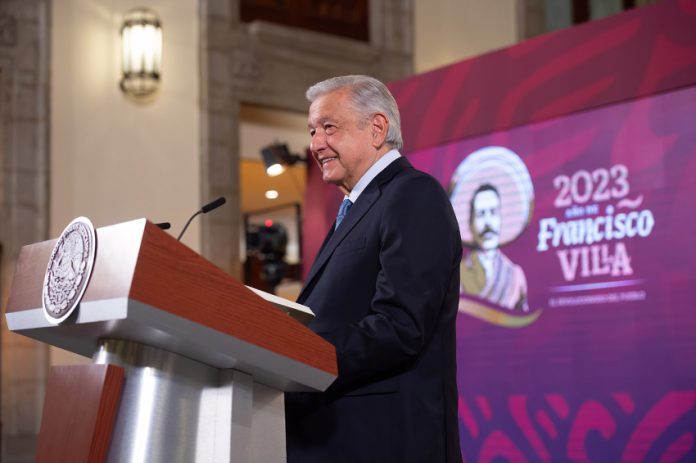President López Obrador dedicates a significant amount of his time to holding forth at his morning press conferences, speaking about a wide range of topics including personal passions such as Mexican history and baseball.
But while the weekday pressers, colloquially known as mañaneras, are lengthy affairs, AMLO confirmed this week that they represent just a small fraction of his workweek.
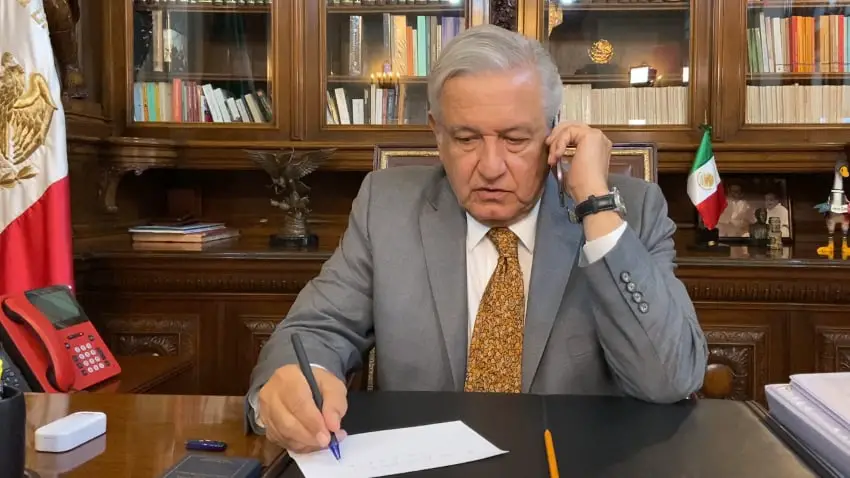
Asked on Tuesday what a “normal day” in his life looks like, López Obrador gave a rundown of his daily activities, saying that he’s “busy all day until night,” but assuring reporters that his work is very satisfying because it provides him with the opportunity to “serve others.”
Among the other issues he addressed at this week’s mañaneras were the Israel-Hamas war, his plan to decentralize the federal government, the criminal charges a former defense minister faced in the United States and the government’s plan to cut the budget of the nation’s judiciary.
Monday
Yucatán Governor Mauricio Vila attended the presser to speak about joint initiatives of the state and federal governments and to formally assume the leadership of the National Conference of Governors (Conago).
A project to expand the port in Progreso, located north of Mérida on the Gulf of Mexico, is slated to begin at the end of the year, the National Action Party governor said.
“What we intend is for the port of Progreso to become a new border with the United States,” Vila said, insinuating that the project will allow greater quantities of freight to be moved between Yucatán and the U.S.
“To achieve that we’re going to increase the depth and width of the navigation channel,” he said, adding that an additional 40 hectares of freight terminal space will be built “on the sea.”
Among the other projects Vila spoke about was Parque de la Plancha, a new park under construction in central Mérida.
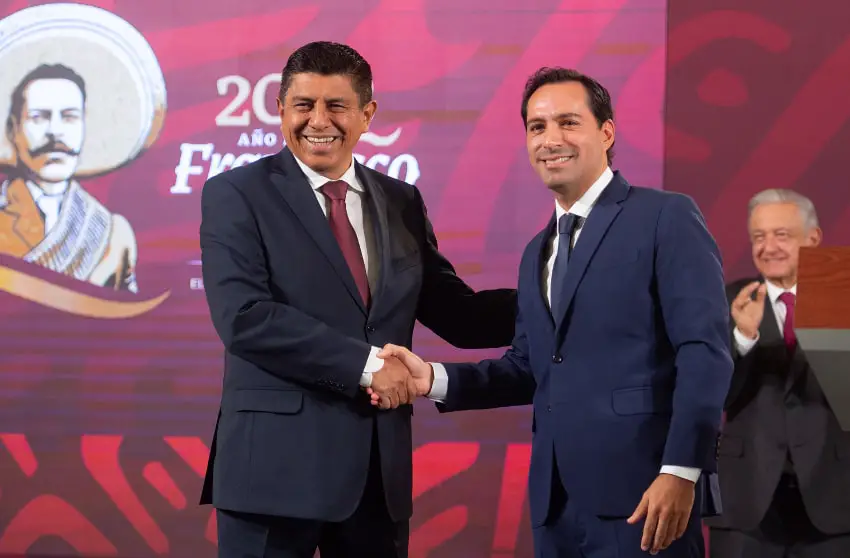
“We’re very happy, Mr. President, because with you we’ll inaugurate this 22-hectare park … on Nov. 19,” he said.
After Oaxaca Governor Salomón Jara transferred the leadership of Conago with a ceremonial handshake, Vila emphasized the importance of state and federal authorities working together in order to “overcome challenges and ensure a more prosperous future for all Mexicans.”
When he took center stage to respond to reporters’ questions, López Obrador was immediately asked about the events in Israel last weekend.
“Our position has already been established,” he said, referring to a statement issued by the Foreign Affairs Ministry that said that the Mexican government “unequivocally condemns the unacceptable attacks against the people of Israel on October 7 by Hamas and other Palestinian organizations in Gaza.”
“We’re in favor of peace, we believe that violence shouldn’t be used,” AMLO said.
After calling on the United Nations to arrange a summit aimed at “avoiding war,” López Obrador announced that two military planes would fly to Israel to bring Mexican citizens home.
“There are about 300 Mexicans who want to leave,” he said.
“… There are reports of three missing Mexicans,” AMLO added, referring to a woman and a man believed to have been taken hostage by Hamas, and another man who was found alive later on Monday.
Later in the mañanera, López Obrador said that Mexico would send a diplomatic note to the United States government to express its opposition to truck inspections being carried out by the Texas government as part of efforts to prevent the entry of undocumented migrants and narcotics.
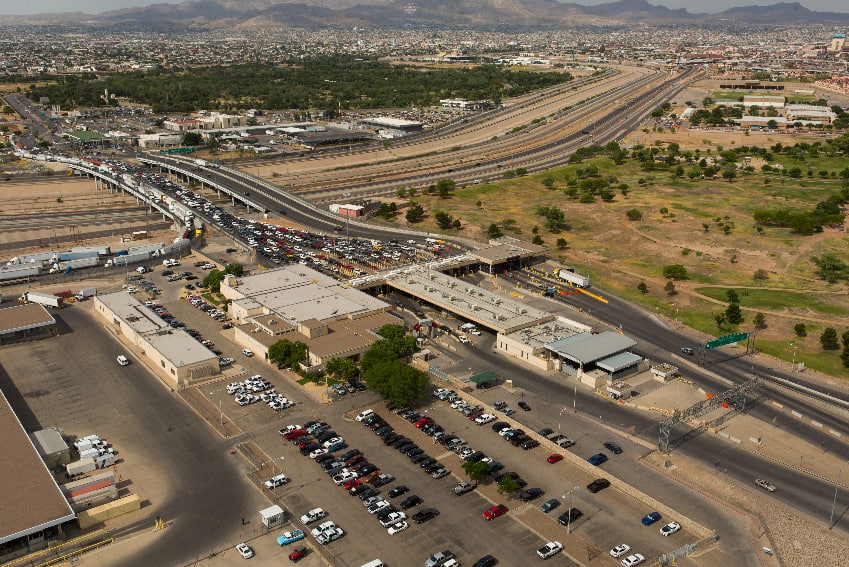
“They’re placing roadblocks on the United States side,” he said, adding that the measure was hindering the northbound and southbound transportation of goods.
“A diplomatic note against these measures is already being prepared and it will be sent today,” AMLO said.
The inspections – which have significantly lengthened border crossing times and generated huge monetary losses – “harm the two nations [and] harm economic activity and the normal movement of people,” he said.
“… It’s the same as the [floating] barriers in the … [Rio Grande], … nothing but publicity stunts, pure politicking. … [Governor Greg Abbott] is not acting responsibly, he’s trying to get a political advantage with these measures, but it will be counterproductive because we’re going to call on our compatriots, our neighbors, our brothers from Texas to not vote for those who act irresponsibly,” López Obrador said.
Two weeks after announcing that he wouldn’t go to the APEC leaders’ meeting in San Francisco next month due to Mexico’s current absence of diplomatic relations with Peru, AMLO said he had decided to go after all.
“It’s a meeting that’s very important for us because of the trade relationship, it’s the meeting of the Pacific and Asia, Asia-Pacific, and we’re going to participate,” he said.
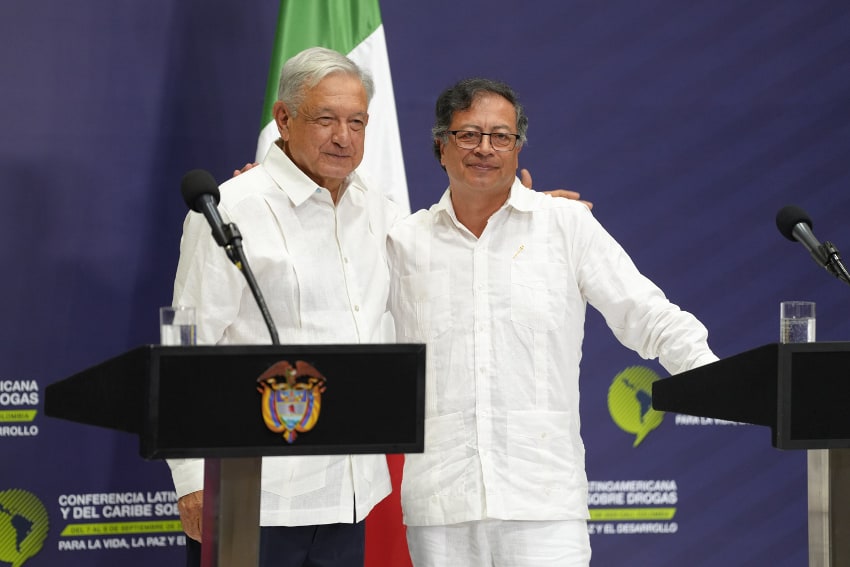
Among other remarks, López Obrador said he would host a regional migration meeting in Palenque, Chiapas, on Oct. 22. He said he had invited the leaders of Ecuador, Colombia, El Salvador, Honduras, Belize, Guatemala, Venezuela, Haiti, Cuba, Costa Rica and Panama “because they are the countries that have the most involvement in everything related to migration.”
The leaders of the majority of the 11 countries have confirmed their attendance, AMLO said.
“I just need to speak with the president of Guatemala and the president of Colombia,” he said.
Tuesday
Twenty governors, the mayor of Mexico City, and high-ranking officials from two other states attended the press conference to formally sign on to the universal health scheme called IMSS-Bienestar.
“There are millions of Mexicans, around half the population, who don’t have social security, who don’t have medical insurance,” López Obrador said, adding that the aim of IMSS- Bienestar is to remedy that situation.
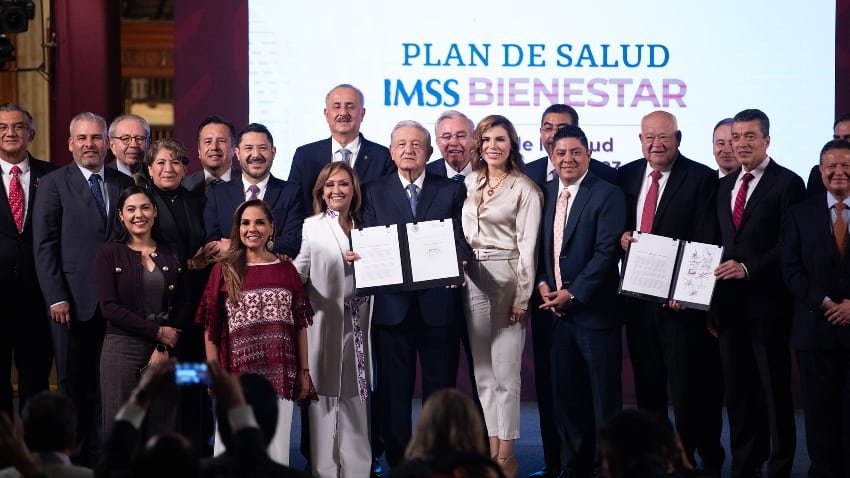
Health Minister Jorge Alcocer said that there are 66.4 million people without social security and that 53.2 million of that number – 80% of the total – live in the 23 federal entities that have so far decided to join the new universal health care scheme.
During his Q and A session with reporters, AMLO was asked whether his commitment to move over 30 ministries and other departments out of Mexico City to various locations around the country still stood.
“Yes, yes, … we have that unfinished business, we have to fulfill that commitment,” said López Obrador, whose government has only moved eight of 32 departments slated for relocation, according to a recent report.
“… With the pandemic we needed to be here [in Mexico City],” he said before noting that his decentralization plan requires money and time.
“… It’s a process. … We have to achieve it in the time we have left [in government]. And if we don’t, leave [the plan] on track and suggest it to the new government,” AMLO said.
López Obrador went on to list a number of things his government has done during his time in office, even though they weren’t among the 100 commitments he made on Dec. 1, 2018 – the day he was sworn in as president.
“The aqueducts we’re building weren’t [among the commitments], the Santa María dam [in Sinaloa] that we’re going to inaugurate in December wasn’t … nor was the designation of natural reserves and we’re going to be the government that leaves more [new] reserves [to our successor than any other],” he said.
Later in the presser, AMLO said he would propose the operation of passenger trains to companies that have concessions for Mexico’s vast railroad system.
When the rail system was “given” to “two very large companies” – Ferromex and Kansas City Southern de México – the government entered into an agreement with them that allows the Mexican state to use 20,000 kilometers of tracks for passenger trains, he said.
“Of course, the tracks are not in optimal condition because they haven’t been given adequate maintenance and they’re used for freight, but the tracks are there,” López Obrador said.
“So if those tracks are upgraded and electrified with overhead power wires for electric trains, imagine what could be done – the country would be connected with passenger trains again,” he said.
“… I want to speak with those that have concessions to say: Why don’t you operate passenger trains within a reasonable period of time? If they say, ‘No, we’re not interested,’ we could see who [else] is interested in having the concession,” AMLO said.
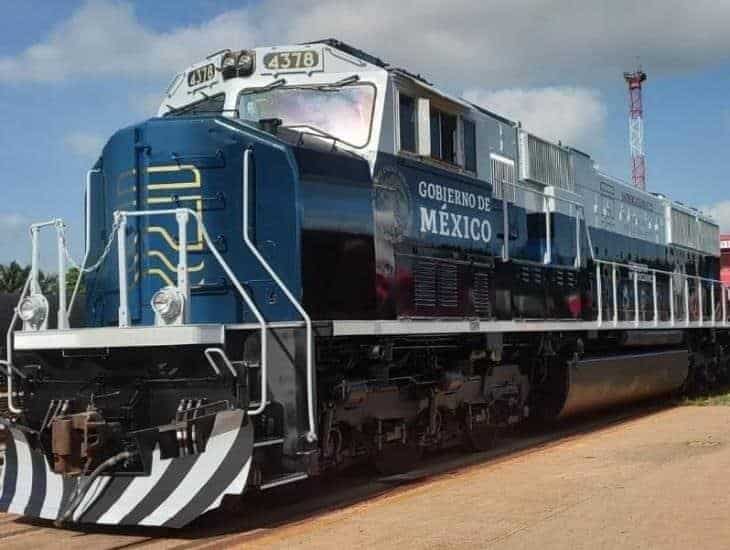
Among other remarks, López Obrador said that auto sector strikes in the United States haven’t had much impact on Mexico and noted that an influenza and COVID-19 vaccination campaign would commence within the next two weeks. “We have enough vaccines to start,” he said.
AMLO also acknowledged that the Israeli Embassy in Mexico expressed its disagreement with statements he made about the events in Israel.
López Obrador said that he respected the statement issued by the embassy, in which it said that it “deeply” regretted that the Mexican government hadn’t adopted a “more forceful and resolute position” in the wake of the attacks perpetrated by Hamas in Israel.
“Hopefully, they understand [our position] because our foreign policy is based on principles and defined in the constitution,” he said.
Wednesday
After fake news debunker Ana García chided “some media outlets” for falsely reporting that Tesla wouldn’t build its planned “gigafactory” in Nuevo León, Civil Protection chief Laura Velázquez joined the press conference via video link to give an update on Hurricane Lidia, which made landfall in Jalisco as a Category 4 storm on Tuesday evening.
Velázquez noted that Lidia, which claimed one life, had been downgraded to a low pressure system after bringing very heavy rain to coastal areas of western Mexico.
Having taken center stage to respond to reporters’ questions, AMLO indicated that he was unconcerned about the recent depreciation of the Mexican peso.
“We have to trust that we have a stable currency, which has been appreciating, strengthening,” he said.
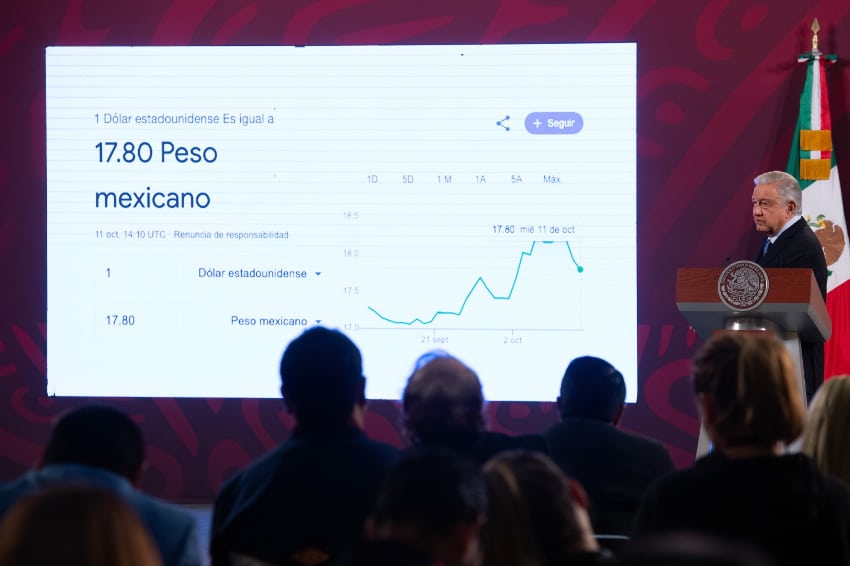
“The peso is still the currency that has strengthened the most against the [US] dollar in the world [this year],” López Obrador added.
“There was an adjustment, it was thought that [the currency] was no longer going to be the super peso, but yesterday it came down again to less than 18 pesos per dollar. In other words, the currency is doing fine and there is a lot of confidence in the economic strength of Mexico,” he said.
“I was surprised, I don’t know whether … to see it in a good light or bad light, but the International Monetary Fund issued a statement saying that Mexico’s economy is very solid, among the best in the world,” said AMLO, a frequent critic of international financial organizations.
“It even increased its economic growth forecast [for Mexico],” he said.
Asked about the IMSS-Bienestar universal health care scheme, López Obrador said that all beneficiaries will be given a card “to keep track of patients’ illnesses.”
“The entire medical service is free, it’s free,” he emphasized.
AMLO noted that some states governed by the Institutional Revolutionary Party (PRI) and the National Action Party (PAN) haven’t signed on to the federal scheme.
“PRI and PAN governments are thinking about it and hopefully they join,” he said.
“Those that don’t, will [still] receive their funds from the federal government, what is rightfully theirs for medical care. In other words, they won’t be left without a [health care] budget. They just won’t join the federal system, which we believe is the best,” López Obrador said.
A short time later, AMLO told reporters that he had to go because he was off to an event to commemorate the 200th anniversary of the foundation of the Heroic Military College.
“I’m going to Perote, Veracruz, because the cadet school, the school to train members of the armed forces, started there,” he said.

“… Before I go, I want to express my satisfaction that one of the best journalists in the world is here at the mañanera, Ignacio Ramonet,” López Obrador said.
“… He’s among the best journalists in the world. I always talk about [Ryszard] Kapuściński, a very good journalist, and Ignacio is a Spanish journalist,” AMLO said before Ramonet gifted him a copy of his book, “Cien Horas con Fidel” (One Hundred Hours with Fidel), and the pair posed for photos.
“It’s a very good interview because [it covers] the entire history of the comandante Fidel Castro from his youth, his childhood,” López Obrador said.
Thursday
Early in the press conference, López Obrador once again accused the DEA of fabricating charges against former defense minister Salvador Cienfuegos, who was arrested in Los Angeles airport on drug trafficking charges in October 2020 but was later returned to Mexico by U.S. authorities without being convicted of any crime.
“We were able to verify that it was an act of revenge and there was no evidence,” AMLO said.
He asserted that Mexico’s exoneration of Cienfuegos made DEA representatives “very angry.”
“They wanted to have a weakened Mexican army, weakened armed forces of Mexico, [with a former defense minister] seated in the dock [of a court] so that they could do whatever they wanted in Mexico, as [former president] Calderón allowed them to do,” López Obrador said.
Speaking as he faced criticism for presenting a “Heroico Colegio Militar Bicentenary medal” to Cienfuegos at Wednesday’s event in Veracruz, AMLO also said there is “nothing” against Cienfuegos in the investigation into the abduction and presumed murder of 43 students in Guerrero in 2014, a crime the army allegedly participated in.
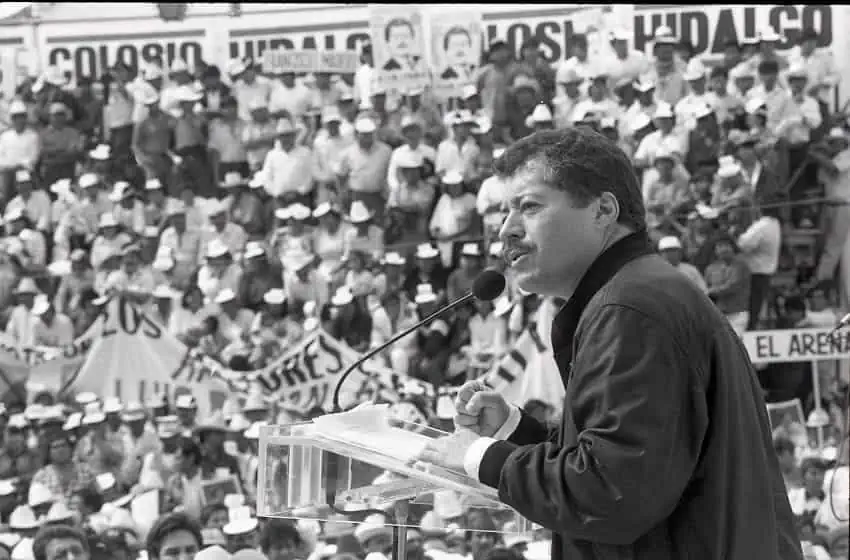
He said he is now leading the investigation into the disappearance of the students and rejected claims that the army hasn’t handed over all the information it has on the Ayotzinapa case. In support of that statement, López Obrador asserted that the army “obeys” him and reaffirmed his commitment to not hide any relevant information.
“It’s a golden rule of democracy. We can’t hide anything at all. And I know they have handed over everything they have in the Ministry of Defense,” he said, referring to information about the Ayotzinapa case as well as the “dirty war” of the 1960s, 70s and 80s.
Later in the presser, AMLO noted that he had dinner with 1994 presidential candidate Luis Donaldo Colosio two days before he was assassinated in Tijuana.
“I had dinner with him on March 21, 1994. … We had dinner in the home of [economist] Clara Jusidman in [the Mexico City neighborhood of] Las Lomas, she was like an intermediary. He wanted to speak to me and it was an important discussion, about two hours, and the next day he went on his [campaign] tour. I think he first went to Sonora, then to Baja California Sur … and then from there to Tijuana and they assassinated him there,” he said.
“They arrested [Mario] Aburto. People started to say it was Aburto. that it wasn’t Aburto, that they replaced [the real killer with Aburto],” AMLO said six days after a court annulled the 45-year prison sentence given to Aburto.
“There was always doubt about whether it was a lone killer or whether other people participated and about who was behind it,” he said.
“I reached the conclusion some time ago that it was a crime of the state,” López Obrador said.
Among other remarks, AMLO said that the doors of government and the ruling Morena party remain open to former foreign affairs minister Marcelo Ebrard, who claimed that the presidential candidate selection process run by Morena was tainted by a range of irregularities.
He also said that two Mexican Air Force planes will depart on Friday to evacuate more Mexican citizens from Israel. AMLO noted that 764 Mexicans who want to leave Israel remain stranded.
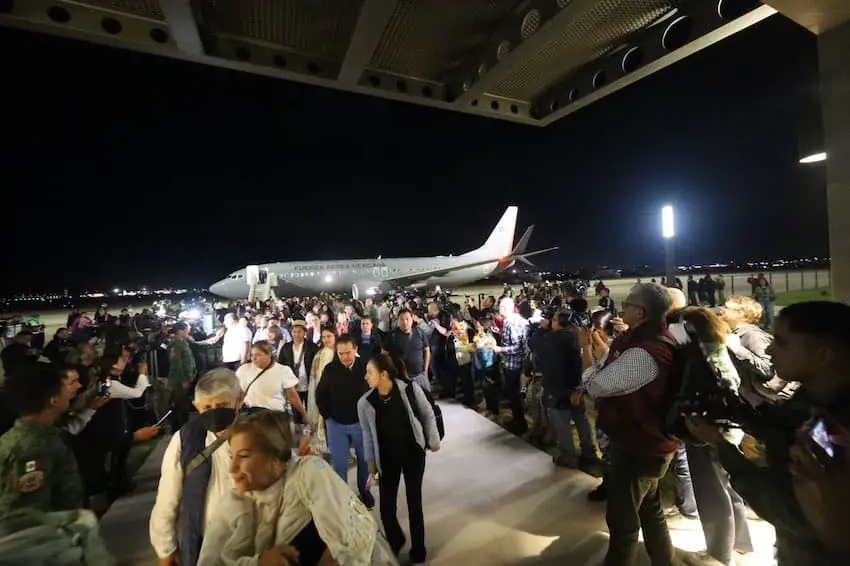
“The pilots and the entire team are resting today, and they leave tomorrow,” López Obrador said of the military and Foreign Affairs Ministry personnel who went on the first two humanitarian flights to pick up Mexicans seeking to escape the Israel-Hamas war.
“We’re going to do an airlift. In other words, we’re going to get everyone out as quickly as possible. The planes will stay there, in Europe, they’ll get people to a nearby, safe country and once we have everyone in that country, in one or two countries, we’ll bring them home,” he said.
Friday
At the very beginning of the press conference, a reporter told the president that the first-ever “judicial strike” could be held in Mexico due to court employees’ discontent with the government’s plan to reduce the budget of the country’s judiciary.
Judges and other court workers are becoming increasingly aware of what a scenario of “austericidio” – a portmanteau of austerity and suicide – would mean, she said.
“It’s natural that the Supreme Court justices are doing a promotion so that the budget isn’t modified,” López Obrador said.
“It’s the most logical thing, they got used to living with privileges. … They’re annoyed and of course they’re going to launch a strategy to avoid having their privileges taken away. I was even told that they’re making agreements with the conservative bloc in the Chamber of Deputies so that lawmakers immediately … present a constitutional challenge [against the planned budget cut],” he said.
AMLO said that court workers have the right to protest, but added that they shouldn’t allow themselves to be manipulated.
The proposed budget cut “isn’t against workers,” he said before asserting that the “manipulative press” has been incorrectly saying that it will affect lower-level court employees and retired judiciary workers.
“No, it’s about cutting privileges from the top,” López Obrador said, adding that judges have even had plastic surgery “at the expense of the treasury.”
“I have proof. When president Peña [Nieto] was in office, they operated on the nose of a judge,” he said, adding that the judge’s wife asked the surgeon to leave her husband’s nose like that of his photogenic predecessor.
Later in the presser, AMLO said that Colombian President Gustavo Petro had confirmed that he will attend the regional migration summit on Oct. 22.
“It will be [a] very good [meeting] because we have to reach agreements … to attend to the migration phenomenon while respecting human rights, providing options, protecting migrants,” he said.
“… We need to come to an agreement because we can do a lot of things. And also, if we agree, we can seek the cooperation of the United States government, ask them to help. They already are, but they should apply themselves more to attending to the causes [of migration], and not just think about walls, about militarizing the border,” López Obrador said.
Three weeks after the regional migration summit, AMLO will travel to San Francisco on what he indicated will be his last international trip as president.
“I don’t think I’ll leave [the country again], but Alicia represents me very well,” he said, referring to Foreign Affairs Minister Alicia Bárcena.
“She’s a very good diplomat, a very good foreign affairs minister, she has a lot of knowledge about economic cooperation, she was in the highest levels of the UN, she was director of the Economic Commission for Latin America and the Caribbean for many years,” López Obrador said.
“… I maintain – and I say it very respectfully for those who think otherwise – that the best foreign policy is domestic policy. … If we make progress here, they’ll respect us abroad,” he added.
“We can’t have a foreign policy … [in which] we give advice or recommendations to other countries, to other people, no. We work on our own matters and maintain the principles of foreign policy that are in the constitution: non-intervention, self-determination, cooperation for development, peaceful solution of disputes. That’s what we’ve done, and Alicia helps me a lot with that,” AMLO said.
During his final presser of the week, the president also acknowledged that heavy rain caused flooding in Puerto Vallarta on Thursday and lamented that a helicopter accident in Durango claimed the lives of three members of the armed forces.
“This extremely heavy rain in Vallarta didn’t cause major damage, fortunately normality has returned, he said.
“… It was an unfortunate accident, … it appears that [the helicopter] got stuck in high tension [power] lines,” López Obrador remarked just before he exited the Treasury Hall of the National Palace to get on with the rest of his lengthy work day.
By Mexico News Daily chief staff writer Peter Davies (peter.davies@mexiconewsdaily.com)
